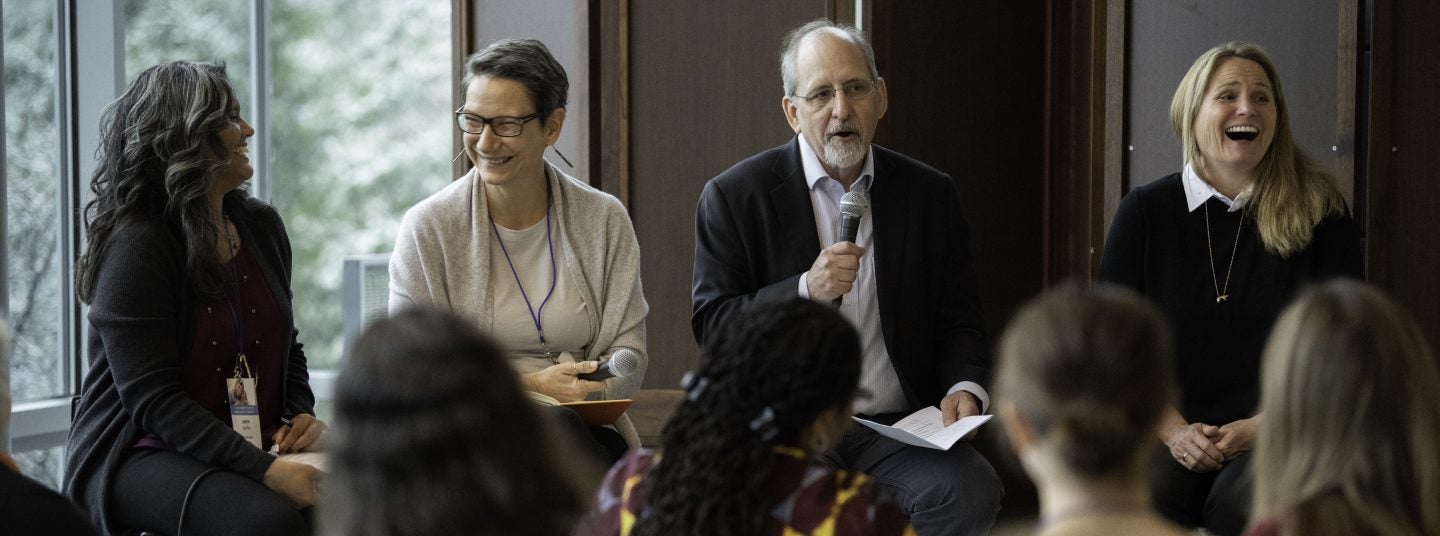As a reprieve from the antics and egos of certain executives, it’s refreshing to hang out around a businesswoman with quiet confidence and the belief that a business can be built, grow, and create value for both customers and employees by keeping the eye on the quality of the product.
A businesswoman like Eileen Fisher.
Women’s fashion may not be on the critical path to saving the planet, but if we all adhered to Fisher’s standards and values, we would be doing a lot less harm. We would even be testing and proving the principles of human rights and sustainability at scale, i.e., fully embedded in the business model across all product lines.
One of the highlights of this summer’s Aspen Ideas Festival was an early morning conversation between Fisher – founder and CEO of the eponymous company which she began in 1984 – and Maureen Conway, who oversees the Institute’s Economic Opportunities Program.
Fisher, a designer at heart, seems to care for her company much like she would tend a garden— cultivating ideas, people, and relationships in pursuit of a quality product while weeding out invasive agents.
When asked how she has handled offers to sell her company and its valuable brand over the years she said, “Once I figured out that the buyer [a major women’s wear player] really didn’t care about the clothes, I said no. I haven’t entertained an offer since.” Instead, she began to distribute stock to employees who now own about 40% of the company.
Fisher lives by organic growth. (Actually, she favors organic everything, especially including cotton and other fibers that define the brand.) In other words, she has built her company by reinvesting her profits, building a market through a growing number of branded retail stores, online sales, and through vendors. She has never raised debt, thus has never needed to compromise product quality or the company’s core values to satisfy an outsider.
Fisher never stops innovating. In addition to investing in wearable fibers, she has pioneered concepts like the circular economy— which has begun to move us beyond the industrial model of take, make, dispose. Companies like Eileen Fisher, Inc. work to recapture and recycle the value after the first use, rather than tossing the product in the landfill. Sustainability is a tall order in an industry where people are now trained to expect uber-low prices.
At a factory in Irvington, New York, Fisher is experimenting with repairing, reusing and “renewing” previously worn clothing for resale. She does this at scale, including a Renew line of products introduced by designers as a regular part of next season’s line. Fisher’s commitment to sustainability and the circular economy is enabled by two key ingredients: customers so happy with the product they can’t bear to just throw it out, and fabrics of sufficient quality to last a lifetime and command premium pricing, even the second time around.
Even then, you have to ask, why bother?
This question takes us to the heart of what makes Fisher who she is— a clarity of purpose that guides decisions up and down the food chain. The company states its mission this way: “to make ethical, timeless clothes designed to work together, wear effortlessly and be part of a responsible lifecycle.”
Eileen Fisher, Inc. is not the only company investing in organic fibers and sustainable manufacturing practices. Levi Strauss obtained the patent for its signature jeans in 1873, and is many times the size of EF, but it also continues to innovate. The company is known today for high labor standards, but also its “waterless” jeans and a new process called Project F.L.X. that eliminates most chemicals in the finishing process. Patagonia is another example of a premium brand with a strong following. The company invests heavily in organics and encourages the recycling of its products. It’s worth noting that all three of these companies are privately held.
To move the market they will need the help of millennials whose spending power is already greater than the boomers. The good news is trendsetters are demonstrating some interest in the ‘less is more’, slow fashion aesthetic that enables Fisher to design for more than just the pocketbook. One of the most successful fashion startups of recent years, Everlane, embodies this spirit with its focus on back-to-basics style that can be worn regardless of passing trends, and its commitment to radical transparency into the conditions at factories where the clothing is produced. The brand has also been called a “millennial fever dream,” andhas doubled sales each of the last three years. Data points like these suggest an encouraging outlook.
In the meantime, Americans toss out around 80 lbs. of clothing per person, per year— a small percentage of which is recycled by the industry, with a massive amount ending up in a landfill. The constant churn of style and color that defines so-called “fast fashion” – comes at a prohibitive cost in both human and environmental terms. Will the business model of low-cost retailers adapt to a different reality?


